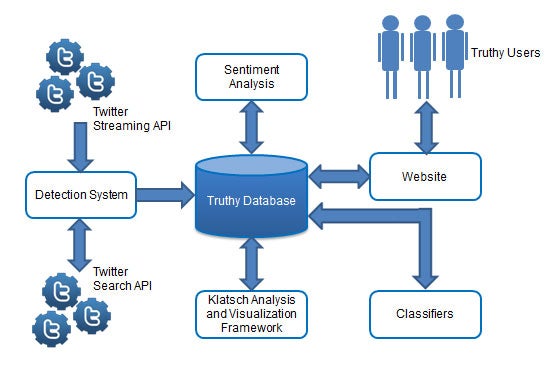US researchers studying how misinformation spreads smeared by Fox News as 'Orwellian'
Federal-funded 'Truthy' database (named after Stephen Colbert's 'truthiness') has been decried as a Democrat plot to monitor right-wing 'subversives'

A group of US researchers compiling a database of ‘hate speech, subversive propaganda and suspicious memes’ to study how false information spreads online have apparently fallen victim to the same tactics they are tasked with studying.
The project, known as the 'Truthy' database, is being run by four scientist from Indiana University who have so far received $919,917 in funding from the National Science Foundation.
The database itself is named after ‘truthiness’ – a word coined by comedian Stephen Colbert to refer to certain ‘facts’ that might not stand up to the rigours of logic, argument or evidence, but that individuals still know to be true intuitively and “from the gut”.
(To quote Colbert: "Now I'm sure some of the 'word police', the 'wordinistas' over at Webster's are gonna say, 'Hey, that's not a word'. Well, anybody who knows me knows I'm no fan of dictionaries or reference books. They're elitist. Constantly telling us what is or isn't true. Or what did or didn't happen.")
The database is particular concerned with what it deems “suspicious memes” – a phrase that has caused some excitement online but that in the context of academic research refers to cultural ideas that might have been planted in some way rather than iwrongly deployed image macros and gifs.
“While the vast majority of memes arise in a perfectly organic manner, driven by the complex mechanisms of life on the Web, some are engineered by the shady machinery of high-profile congressional campaigns,” write the researchers on their project homepage.

In essence, Truthy is a database looking to detect online astroturfing – the hidden deployment of political funds to create the appearance of grass-root campaigns. (In the US, for example, the Tea Party movement has often been accused of being ‘astroturfed’ into existence.)
The project has been active for four years but has recently attracted new attention from right wing news sites and blogs claiming that Truthy is a government-funded project set up by the Democrats to monitor individuals who oppose its policies.
A special report on the database for Fox News on August 26 seems to have kick-started the backlash, with a subsequent report on the broadcaster's website describing ‘Truthy’ as “a little Orwellian” and reminding one analyst of “Joe McCarthy’s hunt for Communists”.
The Washington Free Beacon and Breitbart echoed these sentiments, pointing out that the project’s lead investigator Filippo Menczer is a member of “numerous progressive advocacy groups” including Amnesty International, Greenpeace and Organizing for Action, a non-profit that supports President Barack Obama’s policies.
Twitter users have added their own two cents, asking "Media curiously silent on 'Truthy' [...] So, how soon will Obama @WhiteHouse set up re-education camps for us subversives?" and "If only our government would put in as much effort to track our enemies as they do their citizens."
The researchers themselves have responded in a blog post titled 'The Truth about Truthy', pointing out that they don't catalogue “whether a a statement constitutes ‘misinformation’” but only look at "patterns of information diffusion”.`
Despite this it seems it might be too little, too late. For Truthy’s detractors there’s no point in evidence: they know a front for government surveillance when they see one and what's more they know it from the gut.
Join our commenting forum
Join thought-provoking conversations, follow other Independent readers and see their replies
Comments
Bookmark popover
Removed from bookmarks